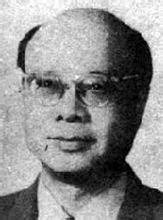Hsiung Fo-hsi (1900-26 October 1965), playwright, educator, and critic, was a leading creator of "popular drama," plays written to educate the peasantry.
Fengch'eng, Kiangsi, was the birthplace of Hsiung Fo-hsi. At the time of the 1911 revolution, Hsiung's father took him to Hankow, where he completed his primary and middle school education. He evinced an interest in drama during his student days, directing and acting in school productions as well as writing two plays which were published in 1919. He entered Yenching University at Peking in 1919 and specialized in literature and education. In May 1 92 1 he helped to found the Min-chung hsi-chu she [people's dramatic society], together with Ch'en Ta-pei, Mao Tun (Shen Yen-ping), and Ouyang Yti-ch'ien (qq.v.) . He was graduated from Yenching in 1923.
Hsiung then went to the United States for graduate work. He studied dramatic art at Columbia University in New York from 1923 to 1926 and received an M.A. degree. After returning to China in 1926, he was appointed professor and chairman of the department of dramatic arts in the school of fine arts at Peking University. He also lectured at Yenching and taught in the department of dramatic arts of the Peking Academy of Fine Arts. In 1930 he became chief editor of the periodical Hsi-chü yü wen-i [drama and literature], a bi-monthly magazine which published plays and articles on the new drama.
In 1932 Hsiung became the director of the rural theater of Tinghsien, Hopei, under the auspices of the National Association for the Advancement of Mass Education. The founder of that association and pioneer of the mass education movement in China, James Yen (Yen Yang-ch'u, q.v.), enlisted Hsiung in an attempt to produce popular drama as a means of educating the peasants of north China. To achieve this end, the dramatist went to rural areas and lived among the peasants so that he could create plays they could understand. Hsiung's role in this rural experiment won him renown. He wrote a book about his experiences entitled An Experiment in Popularizing Drama (1937).
After the outbreak of the Sino-Japanese war in July 1937, Hsiung moved with the National Association for the Advancement of Mass Education to Hankow and then to Changsha. When the association was forced to suspend its activities, he and his troupe, now called the Farmers' Resistance Dramatic Corps, went to Chengtu, Szechwan, where they gave a series of performances to huge audiences. Because of their success, the provincial government established the Szechwan Provincial College of Dramatic Arts in 1942 and made Hsiung Fo-hsi president of the institution. The Chungking authorities named him to head the central youth dramatic club under the auspices of the San Min Chu I Youth Corps. About this time, however, a play that Hsiung wrote about Yuan Shih-k'ai was banned by the government. Increasing censorship distressed Hsiung. He moved to Kweilin, Where he founded two wartime literary magazines, Tang-tai wen-hsueh [contemporary literature] and IVen-hsueh ch' uang-tsao [literary creation], and wrote fiction, short stories, and travel articles. His first novel, T'ieh-miao [iron anchor], was published in 1946. He then wrote a sequel entitled T'ieh-hua [iron flower]. After returning to east China in 1946, Hsiung became president of the Shanghai Experimental School of Dramatic Art.
In the summer of 1949 Hsiung was a delegate to the meeting at Peiping that established the All-China Federation of Literary and Arts Circles. He continued to be prominent in that organization after 1949; he was elected to its national committee in 1953 and again in 1960. He became a member of the standing committee of the All-China Association of Dramatic Workers, the national organization responsible for coordinating work in the theater. He also served on the culture and education committee of the East China regional government apparatus from 1949 until 1954. In June 1955 he was named president of the east China branch at Shanghai of the Central Academy of Dramatic Arts. He also became a member of the National Committee of the Chinese People's Political Consultative Conference, representing the All- China Federation of Literary and Arts Circles. He died in Shanghai on 26 October 1965. Hsiung Fo-hsi is generally regarded as a leading playwright of the so-called popular drama, as distinguished from the literary drama, of which Hung Shen and T'ien Han (qq.v.) were leading representatives. In his work for the theater Hsiung often experimented with Western methods and emphasized stage effects. He specialized in comedy, often with a satirical twist, and attempted to cater to the tastes of the uneducated Chinese playgoer. Many of Hsiung's plays originally were published in the Ch'en Pao [morning post] literary supplement, the Tungfang tsa-chih [eastern miscellany], and Drama and Literature. They were collected and published by the Commercial Press in four volumes, which appeared from 1930 to 1932. Hsiung also published a volume of essays on the drama, Fo-hsi lun-chü and a book on the principles of play writing, Hsieh-chü yuan-li .
Hsiung Fo-hsi married Yeh Chung-yin (Yehtzu), a graduate of the National Drama School who worked at the Szechwan Provincial College of Dramatic Arts in Chengtu when Hsiung was president of that institution.

熊佛西
别名:熊福熙
熊佛西(1900—1965.10.26),剧作家、教育家、批评家。首创“大众戏剧”以教育农民。
熊佛西生于江西丰城。辛亥革命时,他父亲携带他去汉口,他在那里读完了小学和中学。在学生时代他就显示了对戏剧的兴趣,常在学校的演出中担任导演,扮演角色,并写过两个剧本于1919年出版。1919年到北京进燕京大学专修文学和教育。1921年,他与陈大白、茅盾、欧阳予倩组织了一个“民众戏剧社”。1923年毕业于燕京大学。
此后,他去美国入硏究院。1923—1926年在纽约哥伦比亚大学研究戏剧,获得硕士学位。1926年回国,任北京大学美术学院戏剧系主任。他还在燕京讲课,在北京艺术学院戏剧系教书。1930年主编《戏剧与文艺》半月刊,发表剧本和关于话剧的文章和剧本。
1932年,熊佛西当了定县全国民众教育改进会所属的农村剧团团长。民教会的创办人是晏阳初,聘请熊佛西用话剧来教育华北民众。为此,这位剧作家前赴农村与农民一起生活,以便创作民众所能理解的戏剧。熊佛西因此而出名。根据他亲自的经验,写了一本《戏剧大众化的试验》(1937年)。
1937年7月中日战争爆发后,他随同民众教育改进会去汉口,以后又去长沙。该会被封后,熊佛西和他的剧团改称为“农民抗日剧团”去成都,给广大观众多次演出。由于他们的成功,省政府当局于1942年开办了省立四川戏剧学院,由熊佛西任院长。重庆当局请他主持三民主义青年团主办的中央青年戏剧社。但熊佛西那时写了一本有关袁世凯的剧本却被禁演。日益严厉的审查制度使熊佛西很苦恼。他去桂林办了两种战时文学刊物《现代文学》、《文学创造》,写了一些长、短篇小说和游记。他的第一本小说《铁锚》于1946年出版,接着又写了一本《铁花》。1946年熊佛西回华东,当了上海戏剧实验学校校长。
1949年,熊佛西是参加全国文艺联合会成立大会的代表之一。1949年以后,他一直在这个团体中居重要地位,1953年、I960年两次当选全国文联委员。他是全国戏剧家协会常委,1949—1954年,任华东行政委员会文教委员,1955年在上海任中央戏剧院华东分院院长。他又代表全国文联出席全国人民政治协商会议。1965年10月25日在上海去世。
熊佛西以大众戏剧的剧作家而知名,这是与一般的文艺戏剧有所区别的,后者则以洪深、田汉为代表。在他的上演作品中,熊佛西经常试用西方手法和注重舞台效果。他长于喜剧,常带用一些讽刺手法满足未受过教育的群众的爱好。熊佛西的不少剧本最先在《晨报》文学副刊、《东方杂志》和《戏剧与文学》上发表。1930—1932年由商务印书馆编印为四卷出版。他还出版了关于戏剧的短文《佛西论剧》和关于戏剧理论的《戏剧原理》。
他和叶子结婚,她是国立戏剧学院的毕业生,在成都省立四川戏剧学院工作,那时,熊佛西是该院院长。